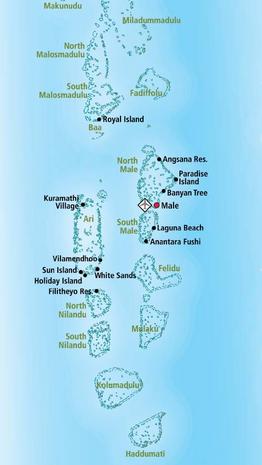 |
Maldives:
Reform In Politics But Not In Religious Liberty
Excerpts from an articly by Elizabeth Kendal, ASSIST News Service, Dezember 08, 2008
On Saturday 29 November, Maldives' Ministry of Islamic Affairs announced that it would block a Dhivehi and English language website which it claimed was promoting Christianity amongst Maldivians.
When Minivan News, an independent news source in Maldives, sought to question Islamic Affairs Minister Dr Abdul Majeed Abdul Bari over the censorship and the contents of the website, he refused to be drawn. So Minivan News did its own investigations. "On Tuesday, as Minivan News searched for the site, it came across one (www.sidahitun.com) which contained material about Jesus Christ and Christian songs published in Dhivehi. The following morning, access to the site was denied."
Minivan reports: "Sheikh Ibrahim Fareed Ahmed, known for his inflammatory sermons, agreed that all anti-Islamic websites should be
|
banned. 'Although this is an Islamic society, some Maldivians' faith in Islam is not very strong,' he said. 'If they have access to these websites, because their belief in Islam is weak, there might be a negative impact.' . . .
"A similar view was upheld by scholar Sheikh Usman Abdullah who said that as the Maldives is recognised as a wholly Muslim society, all anti-Islamic activities, including websites promoting Ch ristianity, should be banned. . . .
"Human rights undergraduate Hamza Latheef, 23, said while the ministry has not officially acknowledged the existence of non-Muslim communities in the Maldives, the fact they wanted to block websites with Christian evangelical content may indicate the reality of the situation. . . .
"The constitution of the Maldives states that everyone has the right to freedom of thought and the freedom to communicate opinions and expression as long as it is not in a manner contrary to any tenet of Islam.
"The Protection of Religious Unity Act (Law No. 6/94) guards against all anti-Islamic activities in the Maldives." (read report here)
On 29 October history was made in Islamic Maldives when a peaceful transition of power was achieved through free and fair democratic elections. Maumoon Abdul Gayoom -- an Islamic scholar who had ruled Maldives as a dictator for some 30 years -- was defeated in a presidential run-off by former political prisoner, torture victim and long-time reform-advocate Mohammad Nasheed (popularly known as "Anni") of the Maldivian Democratic Party (MDP).
In a TV interview on September 3rd, he had promoted several improvements, protection for human rights and a complete tranformation of his country.
However, as Minivan writer Ibrahim Mohamed noted on 3 December, "There may have been a change in government, but so far, this has not extended into the sphere of religion."
The Maldivian Democratic Party is a broad party whose members have dissented from Gayoom's dictatorship for a variety of reasons. While all MDP members were moving away from Gayoom's dictatorship in pursuit of liberty and rights, some were moving towards the West while others were moving towards an even more intolerant fundamentalist Islam.
After the party's religious fundamentalists right-wing faction railed against Nasheed because of his nomination of a female running mate, the gender-equity-advocate Nasheed withdrew his nomination.
Further to this, in order to win the presidential election, Nasheed formed a coalition which included the very small, hard-line, right-wing, Islamic fundamentalist Adaalath (or Adhaalath) Party.
After mutual reproaches of being "Christian" (an offensive name for those deemed to be not sufficiently Islamic) and "without any doubt infidel", doubts arose of what sort of deals has the reformist Nasheed brokered to bring Adaalath on side?
When Nasheed announced his cabinet in early November, Adaalath Scholar's council president, Dr Abdul Majeed Abdul Bari, was named Minister of Islamic Affairs - a man who believes music is "haram" (forbidden) and apostates should be executed (report).
Ibrahim Mohamed reports: "Every single Friday prayer, since the inauguration of the new government, has been led by a religious figure from Adaalath. Only scholars associated with the Adaalath party are allowed to give previously unseen sermons; all other Imams are asked to read sermons pre-approved by the Ministry of Islamic Affairs."
This has the appearance of a Saudi-style deal, where Islamic hardliners are given full control over religion in exchange for "peace", political security, and the Islamic legitimisation of the ruling party. This is pragmatism at its worst, for such an arrangement guarantees Islamic fundamentalism a free ride.
